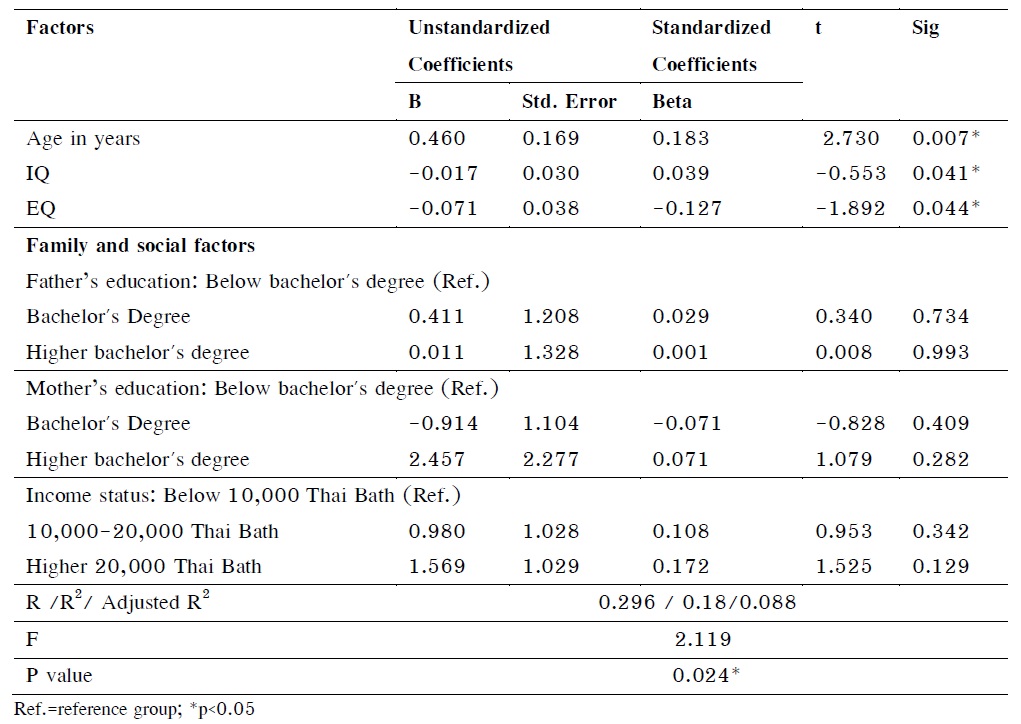Intelligence Quotient and Emotional Quotient Affecting Body Mass Index Among School-Age Children: A Case Study of Nakhon Pathom Province
Keywords:
Emotional quotient, Intelligence quotient, Obesity, School-age childrenAbstract
This study 1) measured the level of intelligence quotient (IQ), emotional quotient (EQ), and body mass index (BMI) in school-age children 2) compared the intelligence quotient (IQ) and emotional quotient (EQ) in school-age children according to personal factors and 3) investigated the individual, family and social factors affecting body mass index in school-age children in Nakhon Pathom Province. A total of 266 children aged 6-11 years old were randomly selected in each classroom from three schools in urban areas of Nakhon Pathom Province in Thailand using the convenience method for selection. IQ scores were assessed using the fourth edition of the test of nonverbal intelligence (TONI-4), and emotional intelligence (EQ) assessed by the emotional intelligence assessment questionnaire for children aged 6-11 years old, Department of Mental Health (DMH), Ministry of Public Health, Thailand. The data was analyzed by using descriptive statistics, independent Sample t-Test, One-way ANOVA, and multiple regression. The results showed that not more than 5% of parents had higher education level and 21.43% of the family and social status have a family income below 10,000 Thai Baht per month. Moreover, the parents’ education level is shown to impact BMI and IQ, while income status of family shows effects on EQ and IQ, also. However, individual factors, such as age in years, emotional quotient (EQ) and intelligence quotient (IQ) affected the body mass index in school-age children of urban areas of the Nakhon Pathom Province, Thailand (p<0.05).
References
Ellulu M, Abed Y, Rahmat A, Ranneh Y, Ali F. Epidemiology of obesity in developing countries: Challenges and prevention. Global Epidemic Obesity 2014;2(1):2.
Department of Health, Ministry of Public Health. The annual reported of department of health [Internet]. 2017 [cited 2019 May 20].Retrieved from: https://www.anamai. moph.go.th/.
Department of Health, Ministry of Public Health. Percentage of school-age children (6-14 years) with onset of obesity and obesity 2021 [Internet]. 2021 [cited 2021 October 12]. Retrieved from: http://dashboard.anamai.moph.go.th/dashboard/overweightstudent?year=2021
Ayana P, Chomchuen T, Tangkawanich T. Factors related obesity behavior of senior high school students in Muang District, Chiang Rai Province. Journal of health Research and Development 2021;7(10):75-89.
Kanazawa S. Intelligence and obesity: Which way does the causal direction go? Current Opinion in Endocrinology, Diabetes and Obesity 2014;21(5):339-44.
Freidl EK, Sysko R, Devlin MJ, Zitsman JL, Kaplan SC, Walsh BT. School and cognitive functioning problems in adolescent bariatric surgery candidates. Surgery for Obesity and Related Diseases 2013;9(6):991-6.
Wong FV. The Association Between Emotional Intelligence, Body Mass Index and Eating Behaviors Among College Students [dissertation]. Master of Science , Hospitality and Dietetic Administration, University of Kentucky; 2011
Homayunnia Firouzjah M, Sheikh A, Homayouni A. Investigating the relationship between emotional intelligence, body image, and eating disorders in team and individual athletes. Journal of Motor Behavior 2014; 15:141-54.
Swami V, Begum S, Petrides KV. Associations between trait emotional intelligence, actual–ideal weight discrepancy, and positive body image. Personality and Individual Differences 2010;49(5):485-9.
Movahhed A, Movahedi A.The effect of body mass index on the emotional intelligence of children. Food and Health 2019;2(1):12-6
Nurmohamadian G, Boland H. The relationship between body image, emotional intelligence, and body mass index. International Journal of Humanities and Cultural Studies (IJHCS) 2016:723-32.
Faul F, Erdfelder E, Buchner A, Lang AG. Statistical power analyses using G* Power 3.1: Tests for correlation and regression analyses. Behavior research methods 2009;41(4): 1149-60.
World Health Organization (WHO). Growth Reference Data for 5-19 Years [Internet]. 2007 [cited 2019 June 3].Retrieved from: http://www.who.int/growthref/en/.
Colom R, Quiroga MÁ, Shih PC, Martínez K, Burgaleta M, Martínez-Molina A, et al. Improvement in working memory is not related to increased intelligence scores. Intelligence 2010;38(5):497-505.
Brown L, Sherbenou RJ,Johnsen SK. Test of Nonverbal Intelligence”, 4th Edition. Austin, TX: PRO-ED;2010
Goleman D. What Make the Leader ? ”, Harvard Business Review 1998;76:93-104
Salahodjaev R, Azam S. IQ and the weight of nations. Personality and Individual Differences 2015;87:105-9.
French MT, Norton EC, Fang HA, Maclean JC. Alcohol consumption and body weight. Health Economics 2010;19(7):814-32.
Philipson TJ, Posner RA. Is the obesity epidemic a public health problem? A review of Zoltan J. Acs and Alan Lyles's obesity, business and public policy. Journal of Economic Literature 2008;46(4):974-82.
Sutin AR, Rogers DL, Mercado A, Weimer A, Rodriguez CC, Gonzalez M, et al. The association between personality traits and body mass index varies with nativity among individuals of Mexican origin. Appetite 2015;90:74-9.
Levitan RD, Davis C. Emotions and eating behaviour: Implications for the current obesity epidemic. University of Toronto Quarterly 2010 ;79(2):783-99.
Kanazawa S. Why liberals and atheists are more intelligent. Social Psychology Quarterly 2010; 73:33-57.

Downloads
Published
Issue
Section
License
บทความทุกบทความที่ตีพิมพ์ในวารสารการพัฒนางานประจำสู่งานวิจัย (JPR2R) ถือว่าเป็นลิขสิทธิ์ของวารสารการพัฒนางานประจำสู่งานวิจัย คณะสิ่งแวดล้อมและทรัพยากรศาสตร์ มหาวิทยาลัยมหิดล





